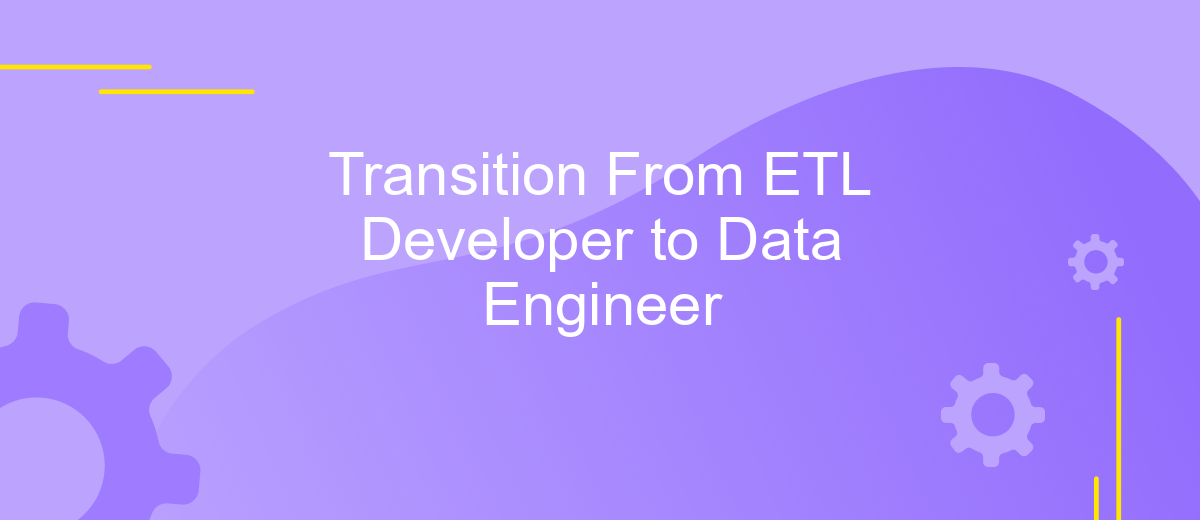Transition From ETL Developer to Data Engineer
Transitioning from an ETL (Extract, Transform, Load) developer to a data engineer marks a significant career evolution in the data management field. This shift not only broadens your technical skill set but also enhances your ability to design and manage comprehensive data pipelines. In this article, we'll explore the key differences, necessary skills, and steps to successfully make this transition.
Introduction
The transition from an ETL Developer to a Data Engineer marks a significant career evolution, reflecting the growing complexity and scale of data operations in modern organizations. While both roles revolve around data, the responsibilities and required skill sets can differ substantially. As businesses increasingly rely on data-driven decisions, the demand for proficient Data Engineers has surged, making this transition both timely and advantageous.
- Broader Skill Set: Data Engineers need to master a wider array of tools and technologies, including big data frameworks like Hadoop and Spark.
- Data Integration: Unlike ETL Developers, Data Engineers often work on real-time data integration, leveraging services like ApiX-Drive to streamline processes.
- Scalability: Ensuring data infrastructure can scale efficiently is a key responsibility, requiring knowledge of cloud platforms such as AWS, Azure, or Google Cloud.
Making this transition requires a commitment to continuous learning and adaptation. By expanding their expertise and embracing new technologies, ETL Developers can successfully evolve into Data Engineers, thereby enhancing their career prospects and contributing more effectively to their organizations' data strategies.
Skills Transition

Transitioning from an ETL Developer to a Data Engineer involves acquiring a broader set of skills and a deeper understanding of data architecture. As an ETL Developer, you are likely familiar with data extraction, transformation, and loading processes. However, as a Data Engineer, you will need to master advanced data manipulation, data warehousing, and big data technologies such as Hadoop, Spark, and Kafka. Proficiency in programming languages like Python, Java, or Scala becomes essential, as well as a solid grasp of SQL and NoSQL databases.
Additionally, understanding cloud platforms like AWS, Azure, or Google Cloud is crucial for modern data engineering roles. Integrating various data sources and services efficiently is another key aspect. Tools like ApiX-Drive can be invaluable, as they facilitate seamless integration between multiple systems and automate data workflows. Developing skills in data pipeline orchestration tools like Apache Airflow or AWS Glue will also be beneficial. Emphasizing these areas will ensure a smooth transition and prepare you for the complexities of a Data Engineer role.
Technical Foundation Expansion

Transitioning from an ETL Developer to a Data Engineer requires a significant expansion of technical skills and knowledge. As a Data Engineer, you will need to master a broader range of tools and technologies to handle the complexities of modern data ecosystems.
- Learn advanced programming languages such as Python, Scala, or Java to build robust data pipelines.
- Gain proficiency in cloud platforms like AWS, Google Cloud, or Azure for scalable data storage and processing.
- Understand distributed data processing frameworks like Apache Spark and Hadoop.
- Familiarize yourself with containerization technologies such as Docker and orchestration tools like Kubernetes.
- Explore data integration tools and services, such as ApiX-Drive, to streamline and automate data workflows across various systems.
Expanding your technical foundation is crucial for the role of a Data Engineer. By mastering these technologies and tools, you will be better equipped to design, build, and manage complex data architectures, ensuring that data flows seamlessly across your organization.
Data Architecture and Governance

Transitioning from an ETL Developer to a Data Engineer involves a deeper understanding of data architecture and governance. Data architecture focuses on the design and structure of data systems, ensuring that data flows efficiently and securely across the organization. A robust data architecture supports scalability, performance, and integration of various data sources.
Data governance, on the other hand, involves policies, procedures, and standards for managing data assets. It ensures data quality, security, and compliance with regulations. Effective data governance is crucial for maintaining the integrity and usability of data within the organization.
- Define data models and schemas to standardize data representation.
- Implement data integration tools like ApiX-Drive for seamless data flow between systems.
- Establish data quality metrics and monitoring processes.
- Develop data security protocols to protect sensitive information.
By mastering data architecture and governance, ETL Developers can enhance their skills and contribute more significantly to their organizations. This transition not only involves technical skills but also an understanding of data management principles, ensuring that data remains a valuable asset.
Career Growth Strategies
Transitioning from an ETL Developer to a Data Engineer requires a strategic approach to career growth. One effective strategy is to continuously update your skill set by learning new tools and technologies. Familiarize yourself with cloud platforms like AWS, Azure, and Google Cloud, as well as big data technologies such as Hadoop and Spark. Additionally, gaining proficiency in programming languages like Python and Scala can significantly enhance your capabilities and make you more competitive in the job market.
Another important strategy is to build a strong understanding of data integration and automation tools. For instance, services like ApiX-Drive can streamline the process of integrating various data sources, making your workflow more efficient. Networking with other professionals in the field through conferences, webinars, and online communities can also provide valuable insights and opportunities for growth. Finally, consider obtaining relevant certifications to validate your skills and increase your credibility as a Data Engineer.
FAQ
What are the key differences between an ETL Developer and a Data Engineer?
What skills should I acquire to transition from an ETL Developer to a Data Engineer?
How important is cloud computing in the role of a Data Engineer?
What tools and technologies are commonly used by Data Engineers for automation and integration?
How can I gain practical experience in data engineering while working as an ETL Developer?
Time is the most valuable resource in today's business realities. By eliminating the routine from work processes, you will get more opportunities to implement the most daring plans and ideas. Choose – you can continue to waste time, money and nerves on inefficient solutions, or you can use ApiX-Drive, automating work processes and achieving results with minimal investment of money, effort and human resources.

